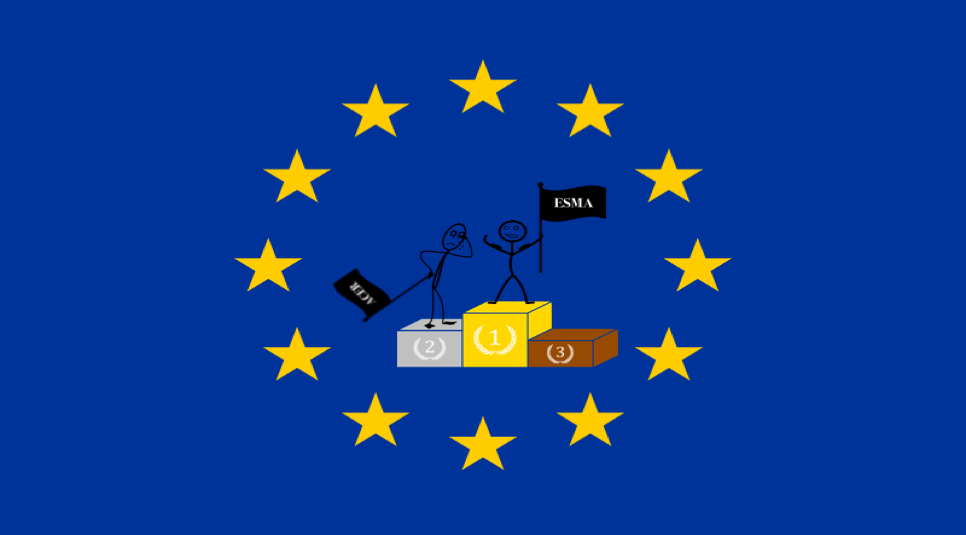By Aleksandar, Juuso & Oli

If there is one thing that scholars love, it is the accurate regulation of an issue, maximizing the predictability of future happenings. The alpha and omega in achieving this is an objective framework which allows for clear rules. Exactly this is what seems to bother scholars in regard to EU agencies; there are no clear and objective criteria for delegating powers to it, giving rise to issues concerning transparency and legitimacy. And yet, EU agencies are springing up like mushrooms after the rain. Some have strong enforcement powers, such as sanctioning powers directed at NCAs or private actors, while other do not. It begs the question, when it comes to delegation, is there any way to predict the outcome, or is it more like flipping a coin? As we will see by comparing two EU agencies established in the same year that have different levels of enforcement powers, ACER and ESMA, the answer lies somewhere in between.

The Meroni doctrine
The conditions provided by the Meroni doctrine, which prohibited the delegation of hard, discretionary powers to bodies not established by the EU Treaties was declared as not applicable to EU agencies in the judgment of the ESMA short-selling case in 2014, as they are established and foreseen by the Treaties. However, when comparing ACER and ESMA, the former one did not receive full enforcement powers, because of the Meroni doctrine, while the latter one did receive them, despite the Meroni doctrine. Given the same year of establishment, it seems that the Commission changed its opinion quite fast. Thus, we can conclude that even before 2014, the guidance provided by the Meroni doctrine was not the only decisive factor.

If we further compare ACER and ESMA in the light of their overall aims, the main difference turns out to be the interest of private parties. While ACER is acting more towards controlling the stakeholders and preventing them from negatively impacting consumer welfare, e.g. through market manipulation, ESMA aims at enhancing investor protection. Could that indicate that lobbying is one of the influencing factors?
Which other factors influence the choice?
There are three different enforcement regimes which the EU legislature can decide to delegate enforcement tasks to, i.e. the Member States, EU networks and EU agencies. The EU legislator’s choice for one or more of these three regimes for enforcement is of relevance as it might help to understand which factors influence the choice for delegation of enforcement powers. This will be done by going through different rationales and reflecting on how ACER and ESMA fit into them.
First, there are certain institutional and policy rationales. They envisage that enforcement powers can only be delegated to an EU network or an EU agency if there is competence to do so under the TEU or TFEU, and if a harmonised body of substantive EU law allows for it. As both criteria are fulfilled regarding ACER and ESMA, these rationales are of little assistance in explaining the difference.
Secondly, there are certain functional rationales, where the key point is that EU agencies, EU networks and the Member State regimes perform enforcement for a different function: EU agencies can be seen as more neutral in regard to national interests, and thereby better equipped to carry out the enforcement. On the other hand, national authorities can be considered in a better position for it, due to the closeness to their citizens and businesses. Perhaps the particularities in the Member States could explain why ACER does not have enforcement powers. When compared to ESMA, the difference could be that allowing national interests to prevent enforcement would undermine the effectiveness of EU financial policy, as ESMA was created as a response to financial crisis. We could speculate that there are not such concerns in the field of energy, as of yet
Last, political rationales might provide a guidance. First, enforcement by the Member States is costly due to administrative infrastructures to enforce EU law. EU Agencies, however, and networks to some extent, can allow for the bundling and pooling of resources. Therefore, the establishment of an EU agency can save money. However, there are non-monetary costs as well, notably so-called sovereignty issues. Political parties in some Member States have been hesitant to accept enforcement by an EU agency or another Member State’s authority, and often prefer that matters are dealt with by their own state. The area of energy is delicate for some countries, and issues regarding sovereignty can arise, which might explain why the Member States wanted to retain their influence to some extent, while at the same time to save money by effectively gathering information sources into one body. When compared with ESMA, effective enforcement in the field of finance could have outweighed any possible sovereignty concerns, perhaps due to the financial crisis in 2008. Such an event can create an impetus to arming agencies like ESMA with the necessary arsenal to carry out effective enforcement. Consequently, one might speculate which powers ACER might have in the event of an energy crisis.

Helpful framework?
The aforementioned rationales form an analytical framework. However, it is not an objective one, as these rationales are rather subjective and depend on various factors, possibly giving rise to issues concerning transparency and legitimacy. Nevertheless, the rationales and the framework are still of help in determining why the EU legislature delegates certain enforcement powers to EU agencies, EU networks or the Member States. For example, in regard to ACER, the functional and political rationales are particularly useful to explain why ACER does not have extensive enforcement powers, compared to ESMA.
